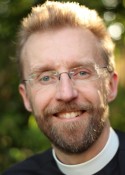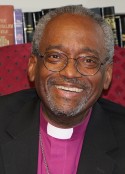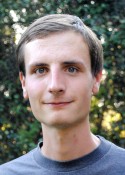Where are they now?
 Anything good you’ve ever been given is yours forever.
Anything good you’ve ever been given is yours forever.
– Rachel Naomi Remen
A couple of months back, I wrote a letter to an old teacher. I wanted to let him know that being his student was a big deal, that my time with him had shaped me in a profound way, that a quarter of a century after I left his classroom, his teaching shapes me still. I wanted to say thanks.
Writing that letter proved to be a kind of prayer, an exercise in gratitude. And it led to an unexpected reunion: my old teacher wrote me back and, when I was in Vancouver a couple of weeks ago, he and I sat in the his garden and drank tea and told stories. Our time together was a kind of sacrament. There in the garden, we discovered an outward and visible sign of the teaching and the learning that we had shared.
I suppose that I’m telling you that story because, when Phil Brochard asked if I would be part of a series of “Where are they now?” articles in which former seminarians talked about the time that they spent at All Souls, I realized that participating in this exercise would also involve writing a letter to an old teacher. Now, in this case, the teacher to whom I am writing – you – is plural rather than singular. But the sentiment is the otherwise same.
During our time together, you taught me so much.
I’d like to remember, in particular, three lessons that you taught me. In the couple of years that I served as a seminarian All Souls (I was with you from 2009 through 2011), I learned that:
An Episcopal parish can be vital and growing – even in the 21st Century, even on the West Coast. It’s a rare week when I don’t come across an article or a tweet or speech that is thoroughly defeated about The Episcopal Church. These communications tend to begin by citing broad statistics of institutional decline and end by morosely announcing that the last remaining Episcopal parish will close partway through the year 2039. They frustrate me because of their innumeracy (if statistical trends guaranteed the future, we’d all get rich on the stock market), because of their functional atheism (without ever saying so explicitly, they proclaim that God is incapable of doing a new thing within our tradition), and because they ignore the tantalizing counterexample of places like All Souls. What does it mean that, in a context in which decline is normative and expected, All Souls is growing in energy and in spirit and in service and in activism and, yes, in numbers? (Maybe the other couple of lessons that you taught me will yield the beginnings of an answer.)
Welcoming people is a skill. To walk into All Souls as a visitor is to encounter one signal after another that the community wants you to be there. Think of the playground: that gloriously spongy floor functions both as a home for holy rambunctiousness and as a symbol of the place that people of all ages have in All Souls’ life. Think of coffee hour: that extension of communion with its fabulous treats is a context in which longtime parishioners actually talk to visitors. Think of the many and gentle invitations that newcomers receive to become deeply involved in the life of the All Souls community. Enthusiasm, as the well-worn saying has it, is infectious. Your enthusiasm for All Souls is a huge part of why your ministry of welcome is so skillful and so effective.
Vital worship matters. The Sunday Assembly at All Souls consistently features challenging and energizing sermons; lively and prayerful musical leadership (I still wear my Angel Band T-Shirt); joyous congregational singing; invitations into service; road-tested words and symbols; and a thousand and one other details that create Eucharist. (If you haven’t done so recently, say thanks to the altar guild and to the folks who run the PA system – the nature of these ministries is that, when done really well, the people doing them become almost invisible.) Sunday morn at All Souls connects us with God, with creation, and with one another. It reminds us that what Jesus calls the Kingdom isn’t something that is stuck in the distant past, but rather is about you and me right now.
Reflecting on these three lessons, I notice a thread running through them: they are all about being Christ-centered. To grow (in every sense of that word), to welcome the stranger, to worship with our words and with our lives: this is the work of the Gospel. The primary reason, in other words, that All Souls is helping people to find healing, belonging, and meaning is that its actions are rooted in in a lived encounter with Christ.
Some five years after I said farewell to you and Bill Fay – God rest his soul – laid his hands upon me and sent me forth with his blessing, All Souls continues to shape and to enliven and inform my work. These days, I serve as Rector of Grace Memorial Episcopal Church in Portland, OR. In common with All Souls, Grace is a growing community with a Spirit-filled Sunday morn an equally Spirit-filled passion for building economic and racial justice. On an irregular basis, I blog and write an advice column, Father Knows Best. And I continue to nurture my other vocations: Dad and Husband and Friend.
I think about you, my old teacher, a lot. I think about everything that you taught me. And I think as well about the wondrous and life-giving work of the Gospel that – even though some 600 miles may separate us – we are doing together.
I’m grateful.
– Martin Elfert
Letter to Episcopal Church from Presiding Bishop, President of House of Deputies
 Jesus tells us to love God and love our neighbor as ourselves
Jesus tells us to love God and love our neighbor as ourselves
[Episcopal Church Office of Public Affairs press release] Presiding Bishop and Primate Michael Curry and President of the House of Deputies the Rev. Gay Clark Jennings have written the following letter to the Episcopal Church.
June 28, 2016
Dear People of God in the Episcopal Church:
We all know that some things in holy Scripture can be confusing, hard to understand, or open to various ways of understanding. But some essential teachings are clear and incontrovertible. Jesus tells us to love God and love our neighbor as ourselves, and he tells us over and over again not to be afraid (Matthew 10:31, Mark 5:36, Luke 8:50, John 14:27).
There’s no confusion about what Jesus is telling us, but it often requires courage to embody it in the real world. Again and again, we become afraid, and mired in that fear, we turn against Jesus and one another.
This age-old cycle of fear and hatred plays out again and again in our broken world, in sickening and shocking events like the massacre targeting lesbian, gay, bisexual and transgender (LGBT) people in Orlando, but also in the rules we make and the laws we pass. Most recently, we’ve seen fear at work in North Carolina, a state dear to both of our hearts, where a law called the “Public Facilities Privacy & Security Act” has decimated the civil rights and God-given dignity of transgender people and, by extension, drastically curtailed protections against discrimination for women, people of color, and many others. We are thankful for the prayerful and pastoral public leadership of the North Carolina bishops on this law, which is known as House Bill 2.
North Carolina is not the only place where fear has gotten the better of us. Lawmakers in other jurisdictions have also threatened to introduce legislation that would have us believe that protecting the rights of transgender people—even a right as basic as going to the bathroom—somehow puts the rest of us at risk.
This is not the first time that the segregation of bathrooms and public facilities has been used to discriminate unjustly against minority groups. And just as in our painful racial past, it is even being claimed that the “bathroom bills,” as they are sometimes called, ensure the safety of women and children—the same reason so often given to justify Jim Crow racial segregation.
But we believe that, as the New Testament says, “perfect love casts out fear.” On June 10, the Executive Council of the Episcopal Church stood against fear and for God’s love by passing a resolution that reaffirms the Episcopal Church’s support of local, state and federal laws that prevent discrimination based on gender identity or gender expression and voices our opposition to all legislation that seeks to deny the God-given dignity, the legal equality, and the civil rights of transgender people.
The need is urgent, because laws like the one in North Carolina prey on some of the most vulnerable people in our communities—some of the very same people who were targeted in the Orlando attack. In a 2011 survey, 78 percent of transgender people said that they had been bullied or harassed in childhood; 41 percent said they had attempted suicide; 35 percent had been assaulted, and 12 percent had suffered a sexual assault. Almost half of transgender people who responded to the survey said they had suffered job discrimination, and almost a fifth had lost housing or been denied health care due to their gender identity or expression.
In keeping with Executive Council’s resolution, we are sending a letter to the governor and members of the North Carolina General Assembly calling on them to repeal the “Public Facilities Privacy & Security Act.” When legislation that discriminates against transgender people arises in other places, we will also voice our opposition and ask Episcopalians to join us. We will also support legislation, like a bill recently passed in the Massachusetts state legislature, that prevents discrimination of all kinds based on gender identity or gender expression.
As Christians, we bear a particular responsibility to speak out in these situations, because attempts to deny transgender people their dignity and humanity as children of God are too often being made in the name of God. This way of fear is not the way of Jesus Christ, and at these times, we have the opportunity to demonstrate our belief that Christianity is not a way of judgment, but a way of following Jesus in casting out fear.
In the face of the violence and injustice we see all around us, what can we do? We can start by choosing to get to know one another. TransEpiscopal, an organization of transgender Episcopalians and their allies, has posted on their website a video called “Voices of Witness: Out of the Box” that can help you get to know some transgender Episcopalians and hear their stories. Integrity USA, which produced the video, and the Chicago Consultation are two other organizations working for the full inclusion of LGBT people in the church. Their websites also have online materials that you can use to learn more about the stories of transgender Christians and our church’s long journey to understand that they are children of God and created in God’s image.
When we are born anew through baptism, we promise to respect the dignity of every human being. Today, transgender people and, indeed, the entire LGBT community, need us to keep that promise. By doing so, we can bear witness to the world that Jesus has shown us another way—the way of love.
Faithfully,
The Most Rev. Michael B. Curry The Rev. Gay Clark Jennings
Presiding Bishop and Primate President, House of Deputies
Welcoming New Members
Earlier in June, we welcomed new members into the All Souls family. Today and in the coming weeks, we’ll hear from many of them.
 My name is Rob Johnson, and I started attending All Souls around the beginning of Lent this year. I’m a Bay Area native, hailing from the western fringe of San Jose. I did my undergraduate work in Human Biology at Stanford University. Following this, I spent time overseas doing humanitarian aid work with refugees in the Middle East. This experience, along with a lifelong fascination with the curious creatures we call human beings, inspired me to venture into the world of academic social psychology. I started this journey in January 2016, with my first semester in UC Berkeley’s post-baccalaureate program in psychology, a preparatory program for doctoral studies. While I come from an evangelical background, over the course of the last few years I’ve found myself slowly but surely drawn to the liturgy, inclusivity, and social consciousness of the Episcopal Church. I consistently began to attend St. Jude’s Parish in Cupertino in late 2015. Now, after relocating to Berkeley, I am thrilled to call All Souls Parish my home, and I look forward to getting you know you all as I continue my journey into Episcopalianism.
My name is Rob Johnson, and I started attending All Souls around the beginning of Lent this year. I’m a Bay Area native, hailing from the western fringe of San Jose. I did my undergraduate work in Human Biology at Stanford University. Following this, I spent time overseas doing humanitarian aid work with refugees in the Middle East. This experience, along with a lifelong fascination with the curious creatures we call human beings, inspired me to venture into the world of academic social psychology. I started this journey in January 2016, with my first semester in UC Berkeley’s post-baccalaureate program in psychology, a preparatory program for doctoral studies. While I come from an evangelical background, over the course of the last few years I’ve found myself slowly but surely drawn to the liturgy, inclusivity, and social consciousness of the Episcopal Church. I consistently began to attend St. Jude’s Parish in Cupertino in late 2015. Now, after relocating to Berkeley, I am thrilled to call All Souls Parish my home, and I look forward to getting you know you all as I continue my journey into Episcopalianism.
In my spare time, I enjoy anything outdoors (particularly hiking), anything involving the arts (particularly music, film, and literature), discussing nerdy things, and cultivating friendships with an eclectic assortment of people.
From the Associate for Ministry Development
 Launching New Connections
Launching New Connections
With the start of school and our wonderfully warm, fall weather, we will begin a new way to welcome people into our community. A Connector Program has been in the works for many years and has had many iterations even in its non-existence (!) but with the help of Betsy Dixon and Jeannie Koops-Elson, along with Phil and Liz, we are finally kicking off our Connector Program.
The Connector Program is a way to welcome new people into our parish, in a more substantial and helpful way. Instead of emails, newcomers will now receive an invitation to dinner, hosted by a few Connectors, who will then continue to help those same newcomers incorporate into the life of our community. The hope is two-fold, that new people will experience a warm and generous welcome from us, and that existing parishioners will more quickly get to know these new folks.
If you are interested in serving in this capacity, please contact me. This is an exciting moment for us as we adapt to the changing dynamics of our church community!
– Emily Hansen Curran



